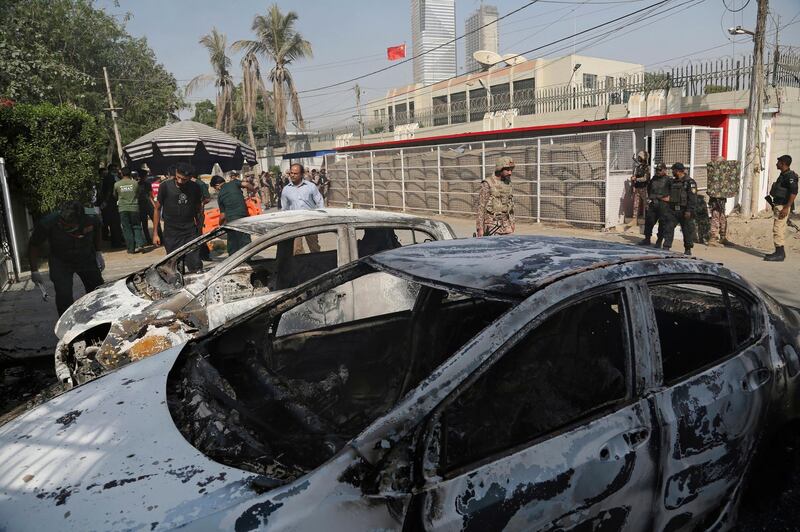A Baloch separatist militant wanted for November's attack on China's consulate in Karachi was killed in a suicide bombing in southern Afghanistan this week.
Aslam Baloch, a founder of the Balochistan Liberation Army who survived other attempts on his life in Pakistan, died in the blast in Kandahar on Tuesday along with five other senior members of the militant group.
Baloch's killing "is very good for peace in Pakistan, particularly Balochistan", a security official told The National.
There was no immediate claim of responsibility for the attack, which was carried out by a suicide bomber who entered the house where the militants were staying. The militia is one of several groups fighting the government in a resurgence of the separatist violence that began in 2003.
Balochistan, the south-western province bordering Afghanistan and Iran, has experienced several insurgencies since Pakistan gained independence from Britain in 1947.
Pakistan accuses Afghanistan and India of supporting and sheltering the insurgents, who in recent years attacked Chinese targets to protest against Beijing-backed infrastructure projects in the province.
The deaths of the militants in Kandahar adds credibility to the claims that Baloch militants use Afghanistan as a base, said Michael Kugelman, deputy director of the Asia programme at the Woodrow Wilson Centre think tank.
But there are many lawless areas in Afghanistan where militants can find sanctuary without state support.
“Just because a Baloch militant commander is revealed to be in Afghanistan does not prove that he is an asset of the state and receiving all the support that comes with such a status,” Mr Kugelman said. “But it does certainly amplify the possibility of state support from Afghanistan.”
Baloch fighters have long used Afghanistan as a refuge but this could change if the US goes through with reported plans to start withdrawing its troops from the country, said Malik Siraj Akbar, a Baloch journalist in Washington.
“In the 1970s and ’80s, Pakistan used the Afghan mujahideen to harass and chase the Balochs, but this time it seems Pakistan hunted him down with the help of its Taliban proxies,” Mr Akbar said.
He said a US troop withdrawal would give the Taliban, ISIS and Pakistan greater influence in Afghanistan and “bring a lot of destruction for the Baloch fighters as their safe spaces will most likely be eliminated for good”.
_______________
Read more:
Thousands vanish without a trace in Pakistan's restive Balochistan
The Baloch rebel leader standing in the way of Pakistan’s economic goals
Pakistan's Gwadar aims to be next Dubai
_______________
Mr Akbar said he spoke to Baloch last week. The militant threatened more attacks against Chinese targets unless it pulled out of Balochistan, where it is building a China-Pakistan Economic Corridor.
The corridor is part of China’s One Belt, One Road initiative to expand its global influence through development of trade-related infrastructure. Beijing is investing almost $56 billion (Dh205.6bn) in Pakistan’s faltering economy through projects for the economic corridor from Xinjiang province to the deep-sea port it is building in the Baloch city of Gwadar.
The consulate attack last month and the bombing of a bus carrying Chinese workers in Balochistan in August were carried out by a group of suicide attackers called the Majeed Brigade, which was formed by Baloch.
Lijian Zhao, deputy chief of mission at the Chinese embassy at Islamabad, welcomed news of the militant leader’s death.
“This is a good development for security and peace in the province,” he told The National. “Balochistan needs development and the terrorists have been against this.”
But Akram Dashti, a Baloch senator, doubted it would bring about any change.
“No killing will bring peace and prosperity in Balochistan,” Mr Dashti said. “The issue of Balochistan needs negotiations and a political settlement.”





